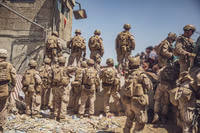The Army's top general said Friday that the service is closing all of its recruiting stations and switching to virtual recruiting after six recruits showed signs of the novel coronavirus at initial military training.
"We are going to basically virtual recruiting. Much of that is done in social media, and that allows us to protect our soldiers and also protect the new recruits," Army Chief of Staff Gen. James McConville told defense reporters at a Pentagon news conference.
"It's happening right now, as we speak. I can't attest to every recruiting station, but that is what we are doing over this week and over the next couple of days," he added.
The announcement comes as the Army had just begun to recover from a recruiting shortfall when it missed its goal for fiscal 2018 by 6,500 soldiers. The service surpassed its recruiting goal for fiscal 2019 after it launched a broad recruiting strategy that targeted 22 major cities and added several hundred recruiters.
Related: Army Clears 1,200 Recruits for Basic Training After Setting Up Virus Screening Measures
McConville's comments come just days after the Army had to hold up 1,200 recruits from shipping to Basic Combat Training to develop a plan to ensure the service's initial entry training centers are not being put at risk of exposure to the coronavirus, known as COVID-19, by incoming recruits.
"We are continuing to send soldiers to initial military training," McConville said, adding that the Army has put "extensive procedures" in place to screen recruits for signs of COVID-19.
"They are screened in the state, and then they move to the military entrance processing stations [MEPS] and they are screened there again to make sure there are no issues. And then they move to the sites where we execute initial military training," he said.
Recruits are screened once again at reception stations before they enter Basic Combat Training.
"We have identified six recruits that have some type of possible symptoms, and we have taken the appropriate measures to make sure that they are being taken care of," McConville said.
He added that the Army has cut the number of recruits shipping to initial entry training in half.
"We have reduced the numbers; we are running about 50 percent," McConville said. "We just ran a test of that."
The Army typically sends about 1,200 recruits per week to Basic Combat Training, TRADOC spokesman Col. Richard McNorton told Military.com, adding that the reduction would mean that about 600 recruits per week are being sent to initial entry training.
McConville said that recruits "go into what we would call a quarantine, even though they are showing no signs, to ensure they are there are no issues" before starting initial entry training.
According to McNorton, recruits are currently not being quarantined if they pass the screening for COVID-19.
Army Secretary Ryan McCarthy said the switch to virtual recruiting is only temporary, based on how the pandemic evolves. He added that he does not anticipate that the service'srecruiting numbers will suffer.
"It's all going to depend on duration; we are looking at this really hard over the next 15 days," McCarthy said. "Right now, it's almost a tactical pause. ... We have had a margin in our recruiting numbers this year, so we are doing very well.
"It's all going to depend on duration, where will we be in a month," he said.
-- Matthew Cox can be reached at matthew.cox@military.com.
Read More: All Military Services Are Now Screening New Recruits for Deadly Coronavirus












